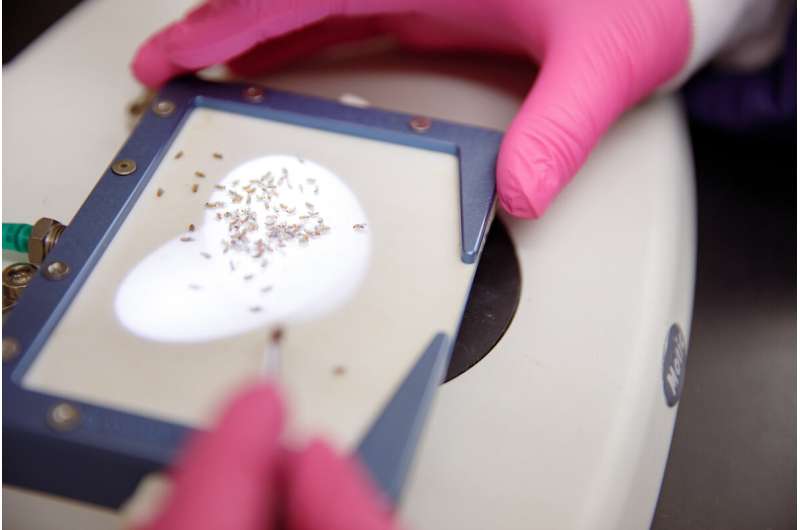Aging fruit flies have impaired genetic responses to viral infections compared to young flies

In a study at The University of Alabama, aging fruit flies died faster than younger flies from a viral infection because of different genetic responses, lowering the older flies' tolerance to the infection.
The findings published recently in G3: Genes, Genomes, Genetics add to the understanding of innate immunity, the first line of defense against infections, which is not fully understood in humans, and prove the fruit fly, Drosophila, is a good candidate for aging immunity studies that could lead to advancements in treating viral infections in older humans.
"We are living in times where there is a substantial increase in aging populations, and we know there is a decline of immune function in humans as we age," said Dr. Stanislava Chtarbanova, UA assistant professor of biological sciences whose lab led the study. "This is the first study to use the fly for investigating age-dependent, anti-viral responses. Our lab can leverage this genetic model to study the molecular mechanisms underlying aging immunity."
The flies in the study, both young and old, were monitored for survival after being given a lethal dose of a Flock House Virus, used on insects to study immunity to RNA viruses. Significant differences in survival were observed between the two age groups. After six days of infection, about 91.7% percent of young male flies were alive while 57.5% of older male flies were alive. After seven days, 78% of young males and 30% of aging males were alive. Females did better than males, but older females died faster, as well.
The defense mechanism to resist the virus through limiting viral replication was about the same in both young and old flies, but the older flies died faster because there could not withstand the virus' effects as well.
"We think older individuals just accumulate more virus, but we found there is not a higher viral load in the aging flies," Chtarbanova said. "It has more do with how well an organism tolerates the consequences of infection, rather than the accumulation of the virus."
The team examined gene expression in the two groups to understand why infection tolerance was poorer in the older flies. They found that expression of genes changes in both groups, but significantly more genes changed expression in older flies.
Genes involved with cell death, immunity and a cell's ability to convert oxygen to energy changed in response to infection, and, in the older flies, more genes changing meant lowered ability to withstand the infection.
Continued studies of the fly can isolate genetic changes as part of innate immunity, the ability of an organism to prevent the spread of an infection, since the insects do not have adaptive immunity to attack the virus as in humans. Further information of the genetic mechanisms that govern survival and control of virus infections at older age could lead to advancing understanding of similar responses in humans.
More information: Lakbira Sheffield et al. Age-dependent impairment of disease tolerance is associated with a robust transcriptional response following RNA virus infection in Drosophila, G3 Genes|Genomes|Genetics (2021). DOI: 10.1093/g3journal/jkab116
Provided by University of Alabama in Tuscaloosa





















